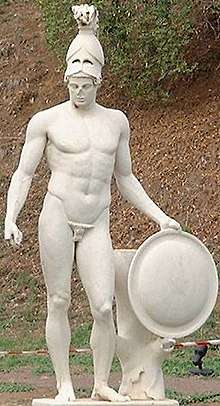Halirrhothius
Halirrhothius (/ˌhælɪˈroʊθiəs/; Ancient Greek: Ἁλιρρόθιος, Halirrhóthios, "sea-foam"[1]) was the Athenian son of Poseidon and Euryte[2] or Bathycleia[3] in Greek mythology. He was also called the son of Perieres and husband of Alcyone who bore him two sons, Serus and Alazygus.[4] Another son of Halirrhotius, Samos of Mantinea was the victor of the four-horse chariot during the first Olympic games established by Heracles.[5]
Mythology

When Halirrhothius raped Alcippe, Ares's daughter by Aglaulus, Ares killed him. Ares was then tried for this in a court made up of his fellow gods. The trial was held on a hill adjacent to the Acropolis of Athens, known as the Areopagus. Ares was acquitted.[2] According to the Parian Chronicle this event took place in 1532/1 BC during the reign of Cranaus.[6]
In another version of the myth, Halirrhothius was sent by his father to cut down the olive that had grown out of the spear of Athena. As he raised his axe, it fell out of his hand and mortally wounded him. The olive was called "fatal" from that circumstance.[7]
References
- The Routledge Handbook of Greek Mythology by Robin Hard (2004). Based on H.J. Rose’s Handbook of Greek Mythology. 29 West 35th Street, New York, NY 10001: Taylor & Francis Group. p. 365. ISBN 0-203-44633-X.CS1 maint: location (link)
- Pseudo-Apollodorus, Bibliotheca 3.14.2
- Scholia on Pindar. Olympian Ode 10.83c
- Scholia on Pindar, Olympian Ode 10.83 as cited in Hesiod. Catalogue of Women, fr.64
- Pindar. Olympian Odes, 10.70
- The Parian Marble, Fragment 3 (March 7, 2001). "Interleaved Greek and English text (translation by Gillian Newing)". Archived from the original on December 25, 2013. Retrieved January 24, 2019.
- Scholia on Aristophanes, Clouds, 1005